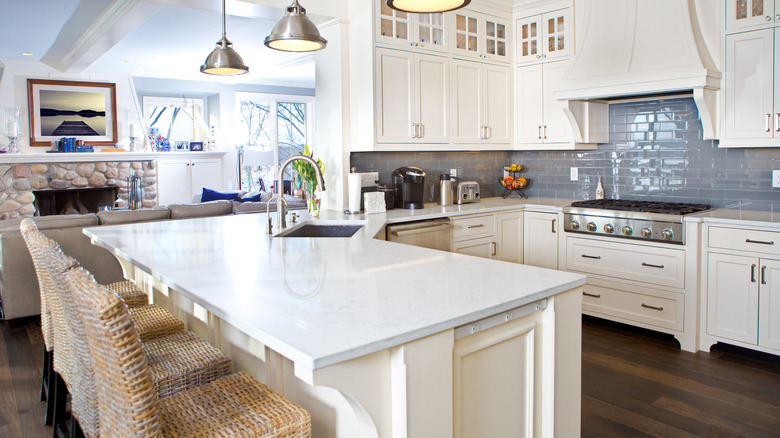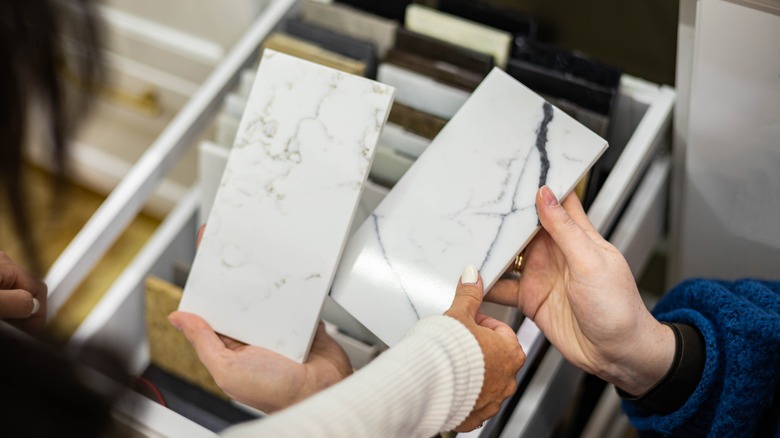Quartz Vs. Granite Countertops: Which Are Easier To Clean?
When it comes to kitchen design, the right countertops can make a world of difference. The wrong material can make your kitchen look cheap, damage easily, or be a cleaning nightmare. Although laminate, wood, or stainless steel countertops are still welcomed in many homes, homeowners, builders, and designers opt for high-quality natural or manufactured stone countertops like marble, quartzite, granite, sintered stone, and quartz. These stone surfaces are hard to beat for beauty, function, durability, and increased property value. Although no material can hold a candle to marble for its luxury status, quartzite offers the same natural allure with more durability. But, these two countertops are notoriously expensive and difficult to clean.
For two of the most popular kitchen countertops on the market, quartz and granite, the battle comes head to head. Their appealing look and lower pricepoint compete with their luxury counterparts. Both surfaces can be highly durable and long-lasting if properly maintained. But if you're wondering which is easier to clean on a day-to-day basis, quartz is the clear winner. Because of it's non-porous nature, it's less resistant to spills and stains. Before you embark on your kitchen remodel, a deeper look at both surfaces reveals potential problems you might want to know about. Examining the pros and cons of quartz and granite when it comes to cleaning and maintenance will help you decide what surface is a rock-solid choice for your kitchen.
Quartz comes out on top
The different structures of these two surfaces mean they have key differences regarding durability, maintenance, and cleaning. The main difference between granite and quartz countertops is that granite is a 100% natural stone mined from the earth, and quartz is manufactured using natural stones and polymer resins. One of the biggest benefits of quartz countertops is that they are non-porous and non-absorbant, while granite needs to be resealed at least every two to five years. Mold, mildew, bacteria, and other liquids can seep into granite but not quartz. Quartz's manufactured nature makes it stronger against solvents, acids, and chemicals, which can cause staining, etching, erosion, and other permanent damage.
The only place where quartz falls short is its temperature limit. Quartz is heat resistant but not heatproof. Hot materials like pans off the stove or out of the oven can cause damage to the resins that comprise quartz, which is only resistant to 150 degrees Fahrenheit. Because granite is a natural igneous rock made under extreme temperatures, it can withstand temperatures over 450 degrees Fahrenheit. Sizzling hot pans and trays likely won't cause lasting damage to granite, but it may weaken the sealant on your countertop, making it more prone to stains. If spills and stains are your main concern, quartz is easier to clean. For temperature resistance, granite has the upper hand.
Selecting the best kitchen surface
Quartz and granite are two of the most durable kitchen countertops on the market today. Most granite and quartz countertops will come with a lifetime manufacturer's warranty for maintenance and cleaning concerns, but heat, stains, and chemical damage won't be covered. Your decision may come down to what dangers your kitchen is more prone to, but other factors may help you make a final decision. For example, some variations of granite may be more expensive depending on the availability of colors and patterns. Since granite is a natural stone, there may be limitations in what patterns are available for purchase. If your granite slabs are rare imports, expect a steeper price. Since quartz can be manufactured locally, it may be more affordable and often comes in numerous styles. Once you've selected a design, it's a good idea to source multiple estimates, factoring in costs like shipping and installation.
In this rock-solid rivalry, both granite and quartz remain popular with homeowners. But, because quartz is generally easier to clean, granite may soon lose its edge. According to the National Kitchen & Bath Association's 2024 Kitchen Trends Report, over 70 percent of industry professionals anticipate that quartz will gain popularity in coming years, while only 32 percent predict the same for granite. For now, both are winners for durability and design. Although there are other factors to consider, like appearance, cost, and personal preference, for quartz and properly sealed granite, cleanup won't be hard.


